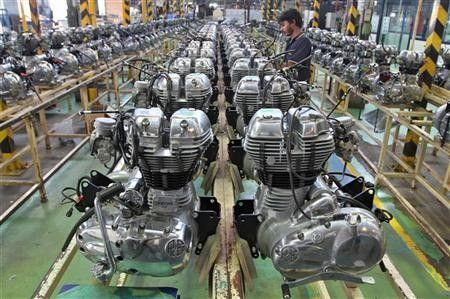PM's Economy Panel Cuts GDP forecast, Warns of Rating Downgrade

Advisers to the prime minister issued a stern warning to the government on Friday on the need to rein in the country's fiscal and current account deficits to avoid the risk of a credit ratings downgrade to junk status.
They urged the government to raise subsidised diesel prices and adopt measures to attract foreign investment, both of which would help ease pressure on the twin deficits and so help an economy that has shifted down several gears this year and the weak rupee.
However, economists doubted the ideas would be turned to action anytime soon.
The suggestions are "well meaning and sound," said Rajeev Malik, a senior economist at CLSA in Singapore. "But the political will to implement the solutions has been lacking. Technocrats cannot do anything about that."
India's economic growth has lost momentum due to global headwinds, sluggish policymaking and more lately worries about a drought in parts of the country. Fearful of a popular backlash, the government has failed to cut expenditure or liberalise the economy to attract investment.
Prime Minister Manmohan Singh's economic advisory panel released a report that acknowledged the economic down shift, which Singh declared this week was a national security issue. However, analysts said some of the forecasts were optimistic.
The panel, for example, cut its forecast for economic growth in the year to next March (2012/13) to 6.7 percent. While that was down from a previous forecast of 7.5-8 percent, it is much higher than projections by private economists, who see growth sliding to 5.5 percent, a 10-year low.
The panel highlighted the swelling fiscal deficit as a major concern and urged the government to raise diesel prices, a long-promised policy that has failed to get political support. Indeed, diesel could exert more pressure on the budget because its use is set to spike this year as farmers turn to pumps to irrigate their fields during the drought.
"Given that ratings agencies are watching the situation, I think the budgeted fiscal deficit at 5.1 percent is a non-negotiable issue" said M. Govinda Rao, a member of the advisory panel.
Economists suggest the government is moving towards a deficit in 2012/13 of around 6 percent of GDP and credit default swap markets already price the country at junk, or non-investment grade.
Global agencies Fitch Ratings and Standard & Poor's Ratings Services this year warned that India may become the first of the BRICS group of large emerging markets to lose its investment grade rating if it did not control the fiscal and current account deficits.
The panel urged the government to raise tax revenues, including by collecting unpaid taxes. It said New Delhi should resurrect a push to allow foreign investment in supermarkets after its attempt to open up the sector flopped late last year.
This time, the foreign investment limit should be capped at 49 percent, not the 51 percent level that sparked fierce opposition, it said.
The panel's call to bring the fiscal deficit under control echoes similar comments from the central bank.
"The best way to prevent a ratings downgrade is to put in place a sustainable process of fiscal consolidation because that's the most important parameter, indicator on which that risk or threat has manifested," Deputy Governor Subir Gokarn said on Thursday.
India's current account, the broadest measure of its trade in goods and services with the rest of the world, ballooned to a record deficit of $21.7 billion or 4.5 percent of GDP in the March quarter.
The panel forecast the deficit would narrow in 2012/13 to 3.6 percent from 4.2 percent in 2011/12 off the back of lower import bills for oil and gold. But panel chief C. Rangarajan said the deficit needed to shrink to 2.5 percent. Above that level the rupee comes under pressure, a panel member said.
The panel raised its inflation forecast for the end of 2012/13 to 6.5-7 percent, up from an earlier forecast of 5-6 percent, to reflect expectations for higher food prices as monsoon rains are well below average.
"The estimates are pretty much in line with Reserve Bank of India's projections, but the growth number seems to be on the optimistic side on the assumption that agriculture growth won't be as slow as (the) market expects," said Rahul Bajoria, regional economist with Barclays in Singapore.
The panel's views are closely watched, however, because they are used by the prime minister's office to determine policy. The finance ministry produces its own estimates.
© Copyright Thomson Reuters 2024. All rights reserved.



















